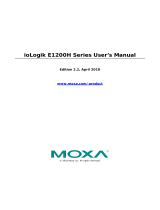
– 1 – – 2 – – 3 – - 4 -
P/N: 1802012001012
ioLogik E1200 Series
Quick Installation Guide
Third Edition, August 2013
Overview
The ioLogik E1200 series comes with 2 embedded Ethernet switch
ports that can form a daisy-chain topology, which is the easiest way
to add more Ethernet devices to a network or connect your ioLogiks
in series. Moxa’s free Active OPC Server offers active (or “push”)
communication that works between Moxa’s ioLogik units and
HMI/SCADA systems, providing instant I/O status reports by “Active
Tags.” The event-driven active tags result in an I/O response time
that is faster than other OPC Server packages.
Model Selection:
*The ioLogik E1213 has source DOs.
Package Checklist
• 1 ioLogik E1200 series remote I/O product
• Documentation and software CD
• Quick installation guide (printed)
Specifications
2 x 10/100 Mbps switch ports, RJ45
1.5 KV magnetic isolation
Modbus/TCP, TCP/IP, UDP, DHCP, Bootp,
HTTP
24 VDC nominal, 12 to 36 VDC
27.8 x 124 x 84 mm (1.09 x 4.88 x 3.31 in)
Standard Models: -10 to 60°C (14 to
140°F)
Wide Temperature Models: -40 to 75°C
(-40 to 167°F)
-40 to 85°C (-40 to 185°F)
Ambient Relative
Humidity:
5 to 95% (non-condensing)
Note: Contact Moxa if you require products guaranteed to function
properly at higher altitudes.
Standards and
Certifications:
5 years (excluding ioLogik E1214*)
See www.moxa.com/warranty
*Because of the limited lifetime of power relay, products that use
this component are covered by a 2-year warranty.
NPN, PNP, and Dry contact
• Logic 0: short to GND
• Logic 1: open
• Logic 0: 0 to 3 VDC
• Logic 1: 10 to 30 VDC (DI COM to DI)
250 Hz, power off storage
Pulse Wave
Width/Frequency:
2.6 A (4 channels @650 mA)
Over-temperature
Shutdown:
175°C (typical), 150°C (min.)
15 to 30 VDC (ext power voltage)
For DO channel:
15 to 30 VDC (ext power voltage), 12 or 9
VDC configurable by jumper.
Pulse Wave
Width/Frequency:
Over-temperature
Shutdown:
175°C (typical), 150°C (min.)
Form A (N.O.) relay outputs, 5A
5 A @ 30 VDC, 5 A @ 250 VAC, 5 A @ 110
VAC
Initial Insulation
Resistance:
Initial Contact
Resistance:
±0.3% FSR @ -10 and 60°C
Sampling Rate (all
channels):
Built-in Resistor for
Current Input:
±0.1% FSR @ 25°C
±0.3% FSR @ -40 and 75°C
Internal register: 400 ohms
Note: 24 V of external power is required when loading > 1000 ohms.
PT50, PT100, PT200, PT500, PT1000
1–310, 1–620, 1–1250, 1–2200 ohms
12 samples/sec (all channels)
±0.1% FSR @ 25°C
±0.3% FSR @ -40 and 75°C
±78.126 mV, ±39.062 mV, ±19.532 mV
Fault and Overvoltage
protection:
±35 VDC (power off); +30 VDC, -25 VDC
(power on)
12 samples/sec (all channels)
±0.1% FSR @ 25°C
±0.3% FSR @ -40 and 75°C
Installation
Connecting the Power
Connect the +12 to +36 VDC power line to the ioLogik E1200’s
terminal block V+ terminal; connect the ground from the power
supply to the V- terminal. Connect the ground pin ( ) if earth
ground is available.
For safety reasons, wires connecting the power supply
should be at least 2 mm in diameter (e.g., 12 gauge wires).
Jumper Settings
Models with DIO, AI, or external power channels require configuring
the jumpers inside the enclosure. Remove the screw located on the
back panel and open the cover to configure the jumpers.
DIO mode configurations are
shown above
Analog mode configurations are
shown
above
DOs on the ioLogik E1213 have 3
possible
external (EXT) power
s, which are shown
Only one field power
can be selected at a time (JP10 /
12V JP5 / 9V JP11)
and the
jumper must be inserted
vertically, not horizontally
(Default: Field Power JP10).
The ioLogik E1213 has 4 pure DO channels and 4 hybrid DIO
channels. For the 4 pure DO channels, you can use the
jumpers to select the power configuration output
(i.e.,
V, 9 V). But for the 4 hybrid DIO channels, you
cannot use the jumpers to select the power configuration
output. Instead, you can only use the jumpers to set the DIO
channels to either DI mode or DO mode.
Mounting
There are two sliders on the back of the unit for DIN rail and wall
mounting.
1. Mounting on a DIN rail: Pull out the bottom slider, latch the
unit onto the DIN-rail, and push the slider back in.
2. Mounting on the wall: Pull out both the top and bottom sliders
and align the screws accordingly.






